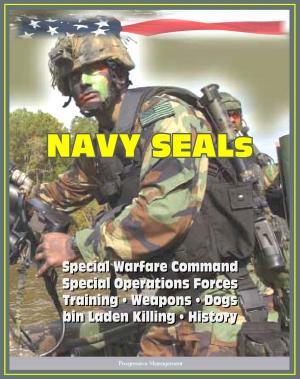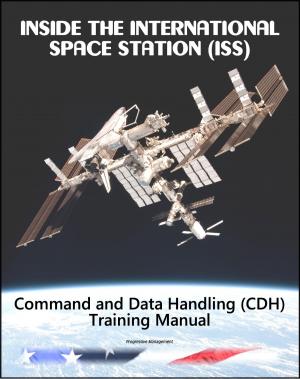Countering Transnational Organized Crime: How Special Operations Forces Build National Police Capacity in Latin America - TCOs in Bolivia, Colombia, Junglas, Honduras, Narcotics and Drug Trafficking
Nonfiction, History, Americas, Latin America, Military| Author: | Progressive Management | ISBN: | 9781370096701 |
| Publisher: | Progressive Management | Publication: | April 3, 2017 |
| Imprint: | Smashwords Edition | Language: | English |
| Author: | Progressive Management |
| ISBN: | 9781370096701 |
| Publisher: | Progressive Management |
| Publication: | April 3, 2017 |
| Imprint: | Smashwords Edition |
| Language: | English |
This excellent report has been professionally converted for accurate flowing-text e-book format reproduction. Transnational organized crime is the principal security threat in Latin America. Beginning in the 1980s, US Special Forces partnered with national police units in Latin America. Initial efforts focused on countering drug trafficking. Today, efforts focus on Transnational Organized Crime. US strategy and policy documents identify this threat, and identify security assistance as one part of US strategy going forward. Yet, the literature record for US Special Forces training national police units to confront the threat is minimal. Thus this research focused on establishing a base for future research and identifying relationships useful to making future policy decisions. The primary research questions is: Why are some US Special Forces partnerships with Latin American national police units effective at countering transnational organized crime? This research encompasses three cases in which US Special Forces partnered with national police units to achieve this objective: Bolivia, Colombia, and Honduras. The cases examine the strategic environment, the units, and the independent and dependent variables. The research determines that the duration of the partnership and the degree of partner nation support are the two most important factors in developing national police units capable of targeting transnational criminal organizations.
The first chapter describes the criminal threat, review US strategy, and explain US Special Forces role in security assistance. It will then explain the what, how, and why of this research. Chapter 2 will examine what has been written about TOC and Special Forces training police. Chapter 3 will describe the research design used to conduct this study and its strengths and weaknesses. Chapter 4 examines three different security assistance programs in which Special Forces supported other US agencies in building national police capacity. Chapter 5 will make conclusions and recommendations off of the case analysis conducted in chapter 4.
CHAPTER 1 - INTRODUCTION * Background * Illicit Markets and Criminal Economic Impact * Impact on Citizen Security * US Policy Context * Security Assistance * Special Operations Forces * Problem Statement * Primary Research Question * Secondary Research Questions * Research Assumptions * Definitions * Scope * Limitations * Delimitations * Significance of the Study * CHAPTER 2 - REVIEW OF LITERATURE * Introduction * Section 1: US Strategic Documents * Section 2: Transnational Organized Crime Policy Papers * Section 3: Military Training Police * CHAPTER 3 - RESEARCH METHODOLOGY * Introduction * Methodology * Analysis Criteria: Dependent and Independent Variables * Case Studies * Strengths and Weaknesses * Areas for Additional Study * Collection Plan * CHAPTER 4 - ANALYSIS. * Introduction * Bolivia * Introduction * Background: Strategic Environment * Operation Snowcap * The UMOPAR * Corruption * Partner Nation Support * US Interagency Support * Duration of Partnership * Targeting of Transnational Criminal Networks * Conclusions * Colombia * Introduction * Background: Strategic Environment * The Junglas * Phase I: Initial Operating Capability (1991-2000) * Phase II: Expansion and Development (2000-2010) * Phase III: Process Improvement (2010-Present) * Partner Nation Support * Corruption * Duration of the Partnership * Interagency Support * Targeting of Transnational Criminal Networks * Conclusions * Honduras * Introduction * Background: Strategic Environment * TIGRES: Concept Development * TIGRES Organization * TIGRES Training
This excellent report has been professionally converted for accurate flowing-text e-book format reproduction. Transnational organized crime is the principal security threat in Latin America. Beginning in the 1980s, US Special Forces partnered with national police units in Latin America. Initial efforts focused on countering drug trafficking. Today, efforts focus on Transnational Organized Crime. US strategy and policy documents identify this threat, and identify security assistance as one part of US strategy going forward. Yet, the literature record for US Special Forces training national police units to confront the threat is minimal. Thus this research focused on establishing a base for future research and identifying relationships useful to making future policy decisions. The primary research questions is: Why are some US Special Forces partnerships with Latin American national police units effective at countering transnational organized crime? This research encompasses three cases in which US Special Forces partnered with national police units to achieve this objective: Bolivia, Colombia, and Honduras. The cases examine the strategic environment, the units, and the independent and dependent variables. The research determines that the duration of the partnership and the degree of partner nation support are the two most important factors in developing national police units capable of targeting transnational criminal organizations.
The first chapter describes the criminal threat, review US strategy, and explain US Special Forces role in security assistance. It will then explain the what, how, and why of this research. Chapter 2 will examine what has been written about TOC and Special Forces training police. Chapter 3 will describe the research design used to conduct this study and its strengths and weaknesses. Chapter 4 examines three different security assistance programs in which Special Forces supported other US agencies in building national police capacity. Chapter 5 will make conclusions and recommendations off of the case analysis conducted in chapter 4.
CHAPTER 1 - INTRODUCTION * Background * Illicit Markets and Criminal Economic Impact * Impact on Citizen Security * US Policy Context * Security Assistance * Special Operations Forces * Problem Statement * Primary Research Question * Secondary Research Questions * Research Assumptions * Definitions * Scope * Limitations * Delimitations * Significance of the Study * CHAPTER 2 - REVIEW OF LITERATURE * Introduction * Section 1: US Strategic Documents * Section 2: Transnational Organized Crime Policy Papers * Section 3: Military Training Police * CHAPTER 3 - RESEARCH METHODOLOGY * Introduction * Methodology * Analysis Criteria: Dependent and Independent Variables * Case Studies * Strengths and Weaknesses * Areas for Additional Study * Collection Plan * CHAPTER 4 - ANALYSIS. * Introduction * Bolivia * Introduction * Background: Strategic Environment * Operation Snowcap * The UMOPAR * Corruption * Partner Nation Support * US Interagency Support * Duration of Partnership * Targeting of Transnational Criminal Networks * Conclusions * Colombia * Introduction * Background: Strategic Environment * The Junglas * Phase I: Initial Operating Capability (1991-2000) * Phase II: Expansion and Development (2000-2010) * Phase III: Process Improvement (2010-Present) * Partner Nation Support * Corruption * Duration of the Partnership * Interagency Support * Targeting of Transnational Criminal Networks * Conclusions * Honduras * Introduction * Background: Strategic Environment * TIGRES: Concept Development * TIGRES Organization * TIGRES Training















